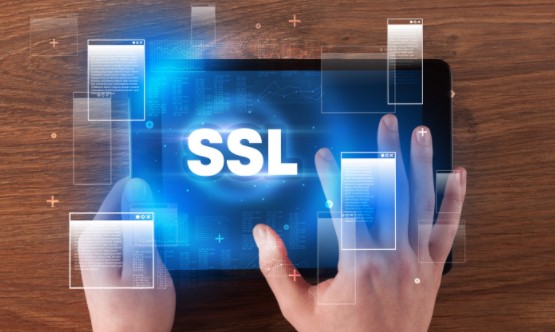Table of Contents
When it comes to website security, you’ll often encounter sites having a padlock icon, green bar, and the HTTPS:// at the beginning of their site’s address. That means the site has SSL. It’s one of the most basic security features that all sites should have nowadays.
You’ll also see that some web hosting providers like Hostinger web hosting will include an SSL certificate when purchasing one of their hosting services. Providers are trying to encourage webmasters to secure their sites through this. Additionally, you can score a free SSL certificate through companies like Cloudflare.
You might wonder what all of that means. In this article, I’ll explain what SSL and SSL certificate is and how it works and why you should have one.
 Let’s get started.
Let’s get started.
What Is SSL?
SSL stands for Secure Socket Layer. It’s a standard layer technology that deals with creating an encrypted connection to secure information transfer between a web server and web browser.
This ensures that the data transferred remains intrinsic and private. SSL has become an industry standard and is currently used by millions of websites to protect online transactions happening on their websites.
Websites using SSL will have HTTPS:// in the address bar instead of HTTP://, and it has become a trust signal for customers.
What Is an SSL Certificate?
SSL certificates are the small data files that establish the encrypted link between a web server and web browser. The link ensures that every data that’s passed between the server and browser remains private.
SSL certificate is further divided into two classifications, where each type of certificate has subtypes. Let’s take a look:
Encryption and validation certificates:
- Domain Validation Certificate (DV) – Only verifies your domain validation and offers low-level encryption. This is the most affordable and quickest certificate to get.
- Organization Validated Certificate (OV SSL) – This verifies that your business and domain validation is genuine and offers medium-level encryption. You’ll see a small green padlock along with the company’s name for sites using this certificate.
- Extended Validation SSL Certificate (EV) – Verifies your business’s name and country. It offers maximum level encryption by including the padlock and HTTPS in the address bar. Of course, this is the most expensive certificate.
Domain number certificates:
- Single Domain SSL Certificate – This protects only one domain and can’t be used to protect your subdomains or other domains.
- Wildcard SSL certificate – This ensures that a certificate for one domain can be used for its subdomains.
- Unified Communications SSL Certificate (UCC) allows multiple domain names to be on the same certificate.
Numerous companies provide these certificates. Some of the known ones are Verisign, InstantSSL, and Geotrust.
How Does It Work?
The first thing you need to know is which type of certificate you need for your website. A standard SSL certificate will usually cover your content, but the cost may vary depending on the certificate providers. You can get an SSL certificate for free when you purchase a hosting plan from a hosting provider.
Once you do have an SSL certificate, here’s how it will work:
- A web browser attempts to connect to a website that’s secured with SSL. The web browser will then request the website to identify itself.
- The website will then send the browser a copy of its SSL certificate.
- The browser will then check whether it can trust the SSL certificate. If it does, it sends back a message to the website.
- The website will then send a digitally signed acknowledgment to allow the SSL encrypted session to start.
- Encrypted data is shared between them.
Why Is SSL Important?
As I mentioned before, SSL has become an industry standard when it comes to internet security. Let’s take a deeper look at the importance of SSL.
- SSL encrypts sensitive information
SSL ensures that when sensitive data is transferred through the internet, only the recipient will access it. This is necessary because the information needs to pass through the internet. If you don’t use SSL, the sensitive information you’re sending can be accessed by bad actors.
- SSL provides authentication
Besides encryption, SSL also helps verify that the information you’re sending to the browser is authentic and not an imposter trying to assume your identity. This is necessary because any computer can pose to be you and trick users into sending them their personal information. It’s only possible to avoid it by having SSL certificates.
- SSL provides trust
Using SSL gives you visual cues that act as trust signals to your visitors. Things like the green bar, padlock icon, and company name means that visitors know that your site is indeed secure. Having HTTPS also helps protect you from phishing attacks.
- SSL is required to be PCI Compliant
When setting up an online store, if you’re going to have the option for your visitors to pay using a credit card and ask for their credit card information, you’ll need to follow the Payment Card Industry Data Security Standard (PCI-DSS). One of the requirements is for your website to have an SSL certificate.
Conclusion
Now you know what SSL is, how it works, and the importance of having one. All that’s left for you to do is buy an SSL certificate and apply it to your site. Remember that you can get one for free when you purchase a hosting plan from a hosting provider.
Good luck!
Author Profile
- Juliet is an Editor at PRable.org, all in one content marketing agency. She loves creating articles about technology, innovative product reviews, and technical writing to help scale up digital growth. She is a writer by day and a frustrated singer by night.
Latest entries
 TechnologyApril 13, 2021What Is SSL in Web Hosting?
TechnologyApril 13, 2021What Is SSL in Web Hosting?









